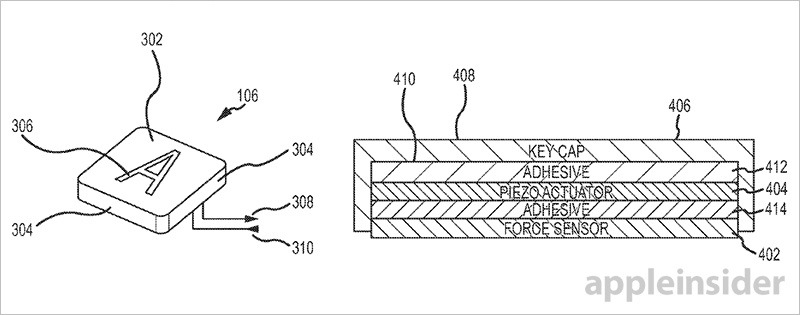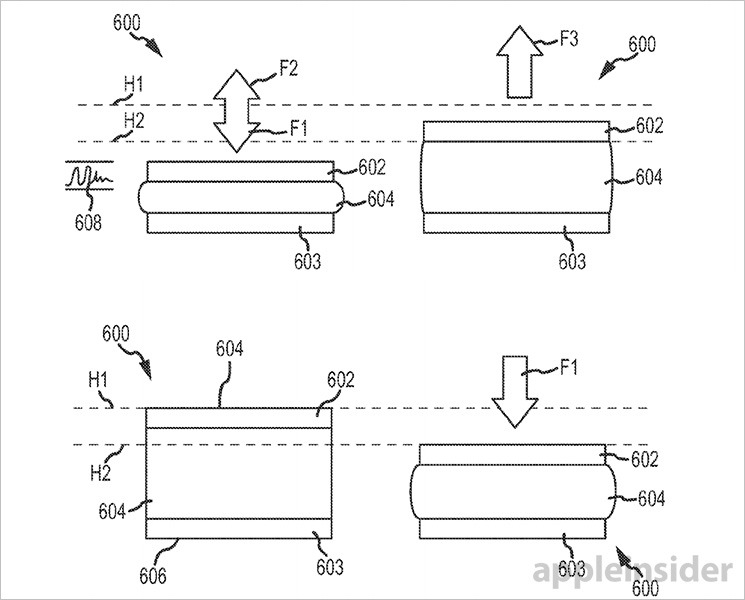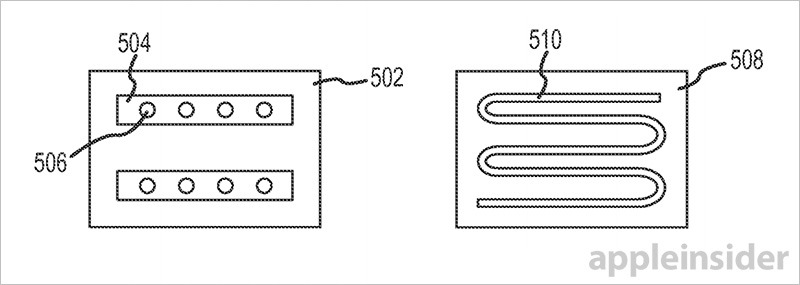Apple is researching ways to implement its Force Touch technology into Mac keyboards, according to a patent published on Tuesday, a move that would not only cut down on key height by removing physical switches, but expand a device's overall utility.
As granted by the U.S. Patent and Trademark Office, Apple's U.S. Patent No. 9,178,509 for an "Ultra low travel keyboard" describes the basic operating principles behind a completely switch-less QWERTY input mechanism reminiscent of the company's Force Touch trackpads. Removing mechanical switches from the equation cuts precious millimeters off key height, allowing for even thinner MacBook designs.
Apple's current MacBook and Mac accessory lineups employ modified scissor switches, or butterfly switches on the 12-inch Retina MacBook, nestled within hollow key caps. Today's patent mirrors the aesthetic of existing designs, but deviates from established technology by replacing mechanical switches for a stack of sensors, actuators and supporting circuitry.
Theoretically the system operates akin to Apple's Force Touch trackpads, but on a much larger scale; one force sensor package for each keyboard key. Force sensors configured to measure downward pressure are integrated beneath the keyboard's key caps, while integrated actuators — part of the key stack — generate haptic feedback.
Ideal force input hardware includes resistive sensors, strain gauges and capacitive sensors, though other components capable of determining downward force and sending a modulated force signal to a computer's CPU are also acceptable. Such sensors can measure the slightest change in distance, offering a highly customizable platform on which to receive varying but distinct levels of input.
Another key stack layer is dedicated to an actuator element implemented with a piezoelectric material. As described, a piezoelectric substrate generates electrical charge when a mechanical force is applied and, conversely, generates mechanical strain from an applied electrical field. These unique electrical properties can be exploited to generate tactile feedback on demand.
In practice the proposed keyboard detects a particular level of input via modulated output signals from an embedded force sensor. To determine the amount of applied force on a single key, signals are received by a keyboard controller and sent off to a keyboard module for processing. A keystroke is subsequently logged and users are provided a corresponding level of haptic feedback presented as a "click" or simulated mechanical movement by the integrated actuator.
With a granular level of input force determination, Apple's keyboard and coexisting software logic can support multiple operations per key. For example, applying a first amount of force to an "A" key might input an "A" character onscreen, while a second level of pressure triggers a system command or other function. A similar procedure is accomplished with 3D Touch on iPhone 6s, which lets users invoke force-sensitive iOS features like Peek and Pop content previews, Quick Actions and more.
It is unclear if Apple has plans to roll out a Force Touch enabled keyboard based on today's patent, though no evidence exists of work on actual hardware or software implementations. Considering some users are already put off by Apple's current low-travel MacBook key mechanisms, a Force Touch keyboard might take some convincing.
Then again, each successive MacBook generation comes with a thinner chassis. A switch-less keyboard design would go a long way toward consolidating dead space.
Apple's Force Touch keyboard patent was first filed for in September 2012 and credits Jeffrey T. Bernstein as its inventor.
 Mikey Campbell
Mikey Campbell






-xl-m.jpg)


-m.jpg)






 Mike Wuerthele
Mike Wuerthele
 Malcolm Owen
Malcolm Owen
 William Gallagher
William Gallagher
 Thomas Sibilly
Thomas Sibilly
 Wesley Hilliard
Wesley Hilliard
 Marko Zivkovic
Marko Zivkovic










30 Comments
Stupid idea. But good to protect the ip.
[quote name="9secondko" url="/t/189900/apple-patents-switch-less-force-touch-keyboard-for-mac/0_40#post_2800501"]Stupid idea. But good to protect the ip.[/quote]how can it be a stupid idea but good to protect. Personally I think this is a great idea.
Thinnest keyboard clicks like a mofo without moving at all. I like it.
"Allowing for even thinner MacBooks..." Dang. I wonder just how thin Apple's laptops are going to be in the coming years.
[quote name="9secondko" url="/t/189900/apple-patents-switch-less-force-touch-keyboard-for-mac/0_100#post_2800501"]Stupid idea. But good to protect the ip.[/quote] Not stupid at all. Though this would seem to require some retraining for touch typists in order to register adequate forces for each respective key, and to get used to the feel of haptic feedback, new keyboards could be better sealed against moisture and dirt and be made thinner and more durable. This patent would garner Apple more revenue from licensing fees and/or further leave the competition in the dust. I love the trackpad on our new rMB, and 3D Touch on my iPhone 6s+.